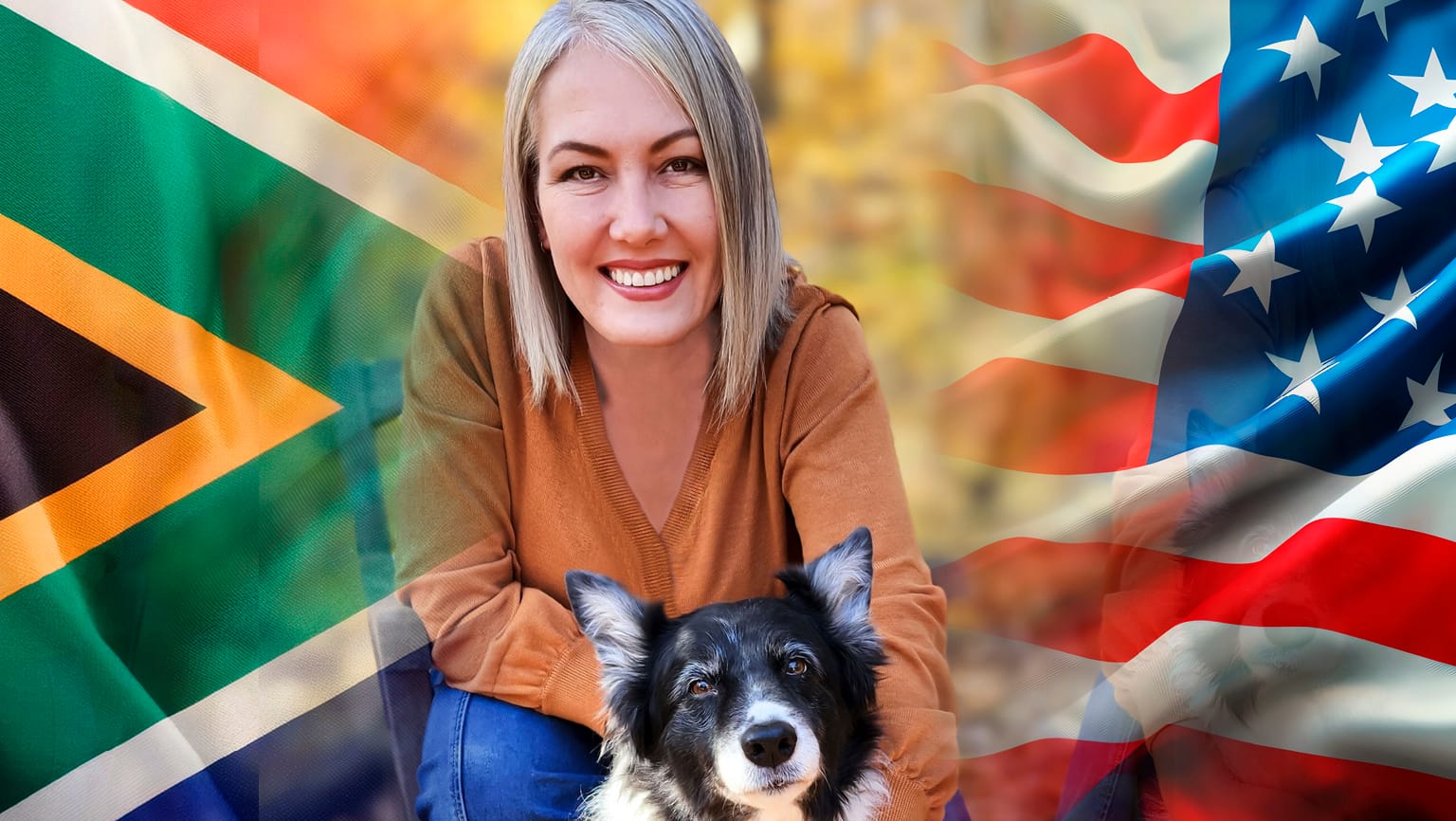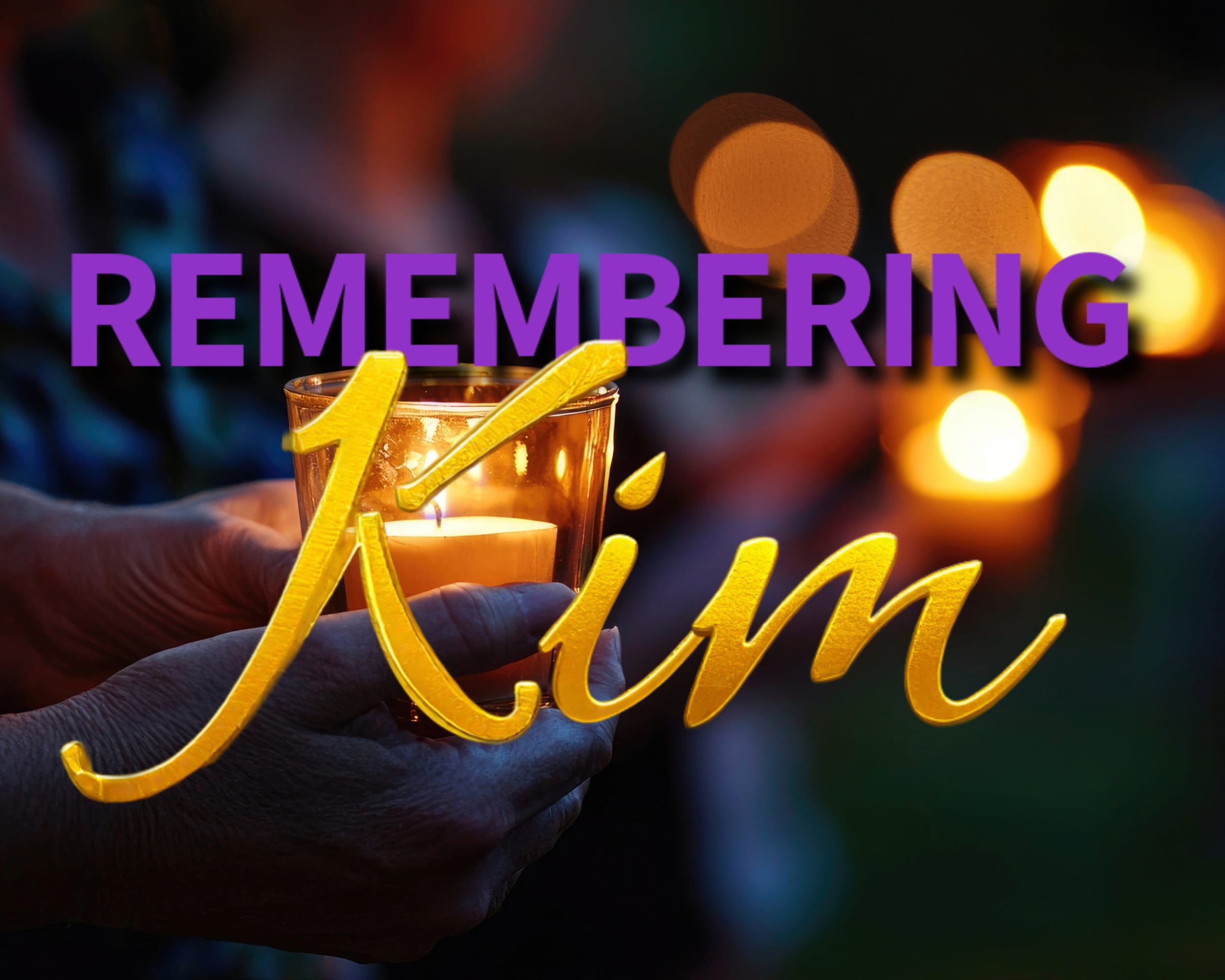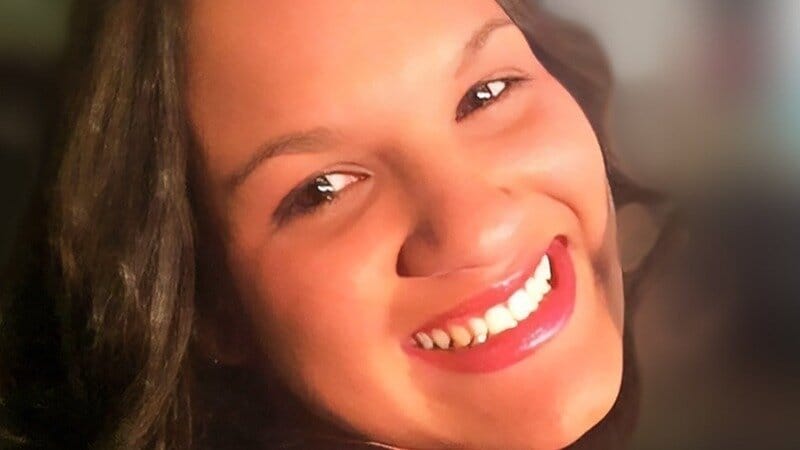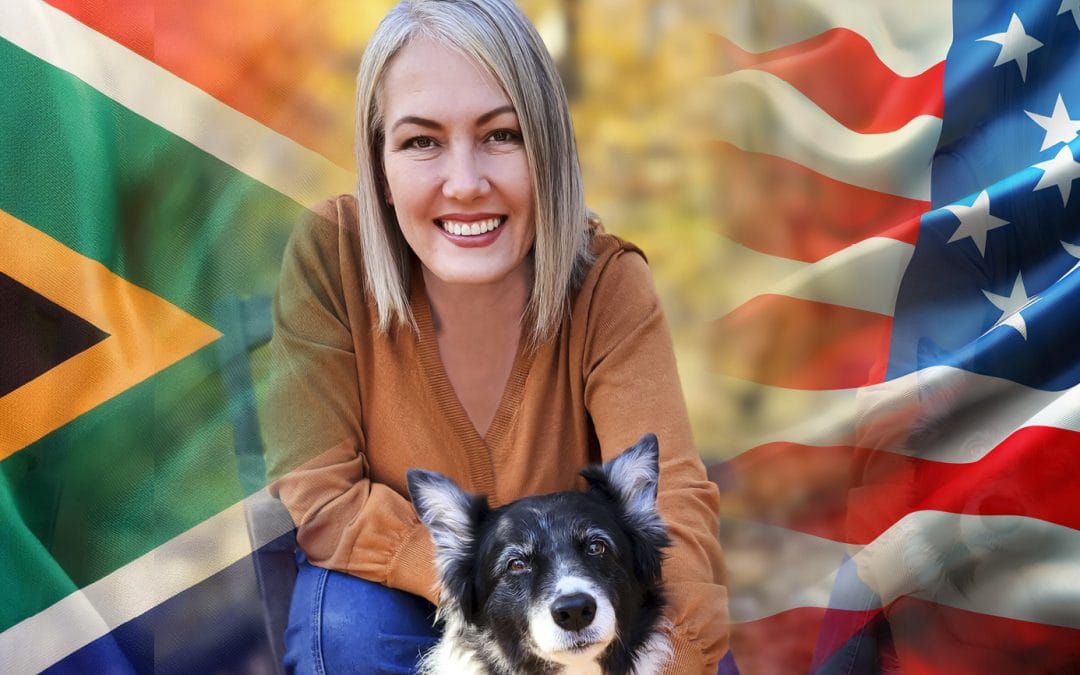When South African-born psychotherapist turned entrepreneur Wanda Voight followed her heart to America, she thought her greatest challenges would be starting over and building a business in a new country. Instead, her path unfolded into something far greater.

Today, as the owner of Nova Home Lovers in Virginia and founder of the women’s support group South African Ladies of Virginia Empowerment (SALOVE), she has created both a livelihood and a lifeline for hundreds of women across the DC, Maryland and Virginia area.
But it was the tragic story of one member, Kim, that propelled Wanda beyond business and community-building into advocacy, leading her to call for the passing of Kim’s Law, a bill she says will protect domestic violence victims’ families from further cruelty at the hands of perpetrators.
Wanda’s immigration to the United States is a story rooted in romance and resilience.
“I met my husband in South Africa while he was there for work,” she explains. “He’s a museum specialist and was in South Africa to restore and fly back a PBY Catalina plane. We fell in love at first sight,” she says.
The couple spent a year together in South Africa before marrying in Limpopo. Soon after, her husband had to return to America, leaving them to navigate a long-distance relationship. “I had my own private practice as a psychotherapist and ran a holistic massage therapy school, so I needed time to wind everything down before I could join him.”
Eventually, he returned to fetch her and her daughter. “We flew to San Diego with him in April 2012. I continued my studies there and reopened my private practice. After three years, his work took us to Colorado Springs, where I opened a bed and breakfast. I loved hosting guests from all over the world.”
But the arrival of the Covid-19 pandemic changed everything. “When Covid hit in 2020, lockdown forced me to close my bed and breakfast overnight. Not long after, my husband was offered a position at the Smithsonian Museum in Washington, and it was an opportunity we couldn’t refuse. So we moved to Virginia in 2020.”
Her entrepreneurial drive, however, never wavered. By 2021, she had embarked on a new chapter with the launch of Nova Home Lovers. “With so many businesses closing their doors during the pandemic, I didn’t want to open a brick-and-mortar shop again. My husband and I had been buying, renovating and renting out properties since 2012, and I’ve always loved real estate and working with people. The transition felt completely natural.”
Her experiences of moving across borders shaped her business model.
“I’ve emigrated and relocated so many times around the world that I knew international real estate and relocation would be my niche. I wanted to help people with every aspect of their journey, not just the practical side, like selling or renting out a home, arranging movers, transporting pets, booking flights and temporary accommodation, or finding their first rental and buying their first home. Just as important is supporting them through the emotional trauma and relocation stress that every move inevitably brings.”
She is particularly passionate about providing clients with guidance that prevents overwhelm.
“There are so many logistics involved, and people often don’t realise how consumed they become when trying to do everything themselves. Self-care is vital. Having someone by your side with both experience and resources makes all the difference. Through relocation coaching, I create a step-by-step plan tailored to each client’s unique circumstances,” she explains.
But while her business gave her purpose, she still longed for a sense of community. “When I moved to Virginia during Covid, there were no South African women’s support groups in the area,” she recalls. “For obvious reasons, people weren’t doing anything. But I needed the support of my people, so I started my own group – South African Ladies of Virginia Empowerment, or SALOVE.”
What began as a handful of women connecting online has grown into a thriving network.
“At first, it was just a few ladies here and there,” she says. “But today, only three years later, we are 315 members strong, from all over Africa, living in the DC, Maryland and Virginia (DMV) area. We keep it super local because we don’t want to be just another Facebook group. We want to meet face-to-face and be able to drive over when someone’s in need. That makes all the difference.”
The group has developed into a close-knit community bound by empathy. “We’ve grown into an amazingly supportive, compassionate group of women who are always ready and willing to help. It truly takes a village. We know each other personally, and everyone knows they can reach out whenever they need something or just someone to listen. It’s magical, really. We are sisters, deeply connected in unity and love.”
SALOVE has even adopted a mascot that embodies their ethos. “Our mascot is the lioness because she symbolises strength and devotion to her pride, just like we do.”
This year, she took the initiative a step further by creating the SALOVE Ambassador Programme.
“Because our members live all over the DMV area, it was impossible for me to do everything myself. Now, each county has its own ambassadors who can respond more quickly and directly when someone needs help. It’s about standing together to uplift and support each other.”
And it’s not all serious. “We have lots of coffee dates and events throughout the year,” she adds. “That’s part of the magic too… Sharing fun, laughter and friendship alongside the serious support.”
Kim’s story
Kim, a member who had recently joined SALOVE, was murdered during a domestic violence incident.
Kim joined SALOVE a month before the tragedy happened.
Wanda says Kim reached out to the group to start making friends and attend its coffee dates and events.
“I reached out to her and was in the process of arranging a one-on-one coffee date with her when it happened. I never had the chance to meet her personally, and I wish to this day we were able to connect before it was too late.
“That morning, my messages on my phone were overwhelming when I woke up. Everyone was shaken up and wanted answers.”
Wandra reached out to women in her group and discovered that Kim’s aunt was in Cincinnati.
“I contacted her, told her who I was and offered to help as I knew that Kim had just moved to Virginia and had no family or friends here.”
Since then, the two women arranged everything together.
“I helped arrange her cremation and the logistics of getting her family here from South Africa. SALOVE arranged Kim’s vigil, and I made sure her family was well taken care of while they were here.”
After her family left, Wanda arranged an estate sale to clear out their rental home, did the move-out cleaning and handed the keys back to the owner.
“My ladies from SALOVE all jumped in and helped. They brought food and drinks, took turns sitting with me while the estate sale was running, to ensure no one took anything, and they took stuff away to consignment stores and donation places. I truly could not have done it all in the short timeframe I had without them.
“This is what SALOVE stands for. Community and unconditional love and support. We are all one big pride of lionesses who take care of our pride with so much passion and love. It is our values, mission and passion to support African women here in the DMV,” she says
Touching lives
When asked how Kim’s story touched her life, Wanda says: “Sho! Where do I begin? Kim’s story reintegrated the need for SALOVE. She was the second South African woman we lost to domestic violence. It shook our whole group. It made everyone realise the importance of the ambassador programme and the work we do.
“So many more ladies joined SALOVE. So many of my ladies reached out and wanted to get involved and help where they could. It was beautiful to see us all stand together as a group and the empowerment that stems from that.
“More ladies reached out to me because they were in a similar situation to Kim. I was able to help more women because of Kim. Her tragedy has opened so many opportunities for women to speak up and get the help they need. I think she is sad to not be with her little boy any longer, but I also think that she is softly guiding so many of us from above. Her spirit is here with us and with all the women in the same situation as she was,” says Wanda.
Recently, another woman needing assistance reached out to Wanda.
“I received a phone call from another girl who needed to get out of her situation urgently. I took her in, and with a few other SALOVE ladies, we were able to get her out and provide her with a safe place to live and the resources she needed.
“While she was here, she asked me if I had clothes for her to wear to her court case since she left her home with only what she was wearing at the time. I still had a pair of Kim’s shoes among a few other belongings in my basement for safekeeping until her aunt could come and get them.
“I gave her clothes and Kim’s shoes. They fitted her perfectly. She went to court, and afterwards she wrote me the following to pass on to Kim’s family:
‘This morning, I walked into a courtroom for my very first hearing as a victim of domestic violence. I was scared. I had no lawyer. I hadn’t eaten. I had no proper clothes of my own, just what someone kindly gave me. But what stood out most were the shoes I wore. They were Kim’s.
‘Before walking into that courtroom, I sat quietly and slipped her shoes on my feet. And I said out loud, ‘Kim, you are going to step into this courtroom with me. You’re going to help me, support me, and hold me while I stand there’. And somehow, she did. I had been anxious and trembling. But the moment I put on her shoes, I felt a wave of peace and strength wash over me. I felt like I could stand tall. Like I could face this thing I had been so afraid of. And when my name was called and I stood up, alone, without an attorney, I knew deep in my heart I wasn’t truly alone. It felt like Kim was right there with me, steadying my knees, lifting my chin, calming my hands. She gave me that extra strength when I had none left. That courage I didn’t think I had. She held me up when I didn’t think I could stand. And then, something incredible happened. Just when I was praying for help, a legal aid attorney walked in and asked if anyone needed representation. It felt like a miracle. A sign. A whisper from above, reminding me that God sees us, even in our most silent cries. That Kim saw me, too. I never met Kim in person. But today, in her shoes, I felt her heart beside mine. I felt her story giving voice to mine. I felt her spirit fighting with me and for me. After the hearing, I sat in my car and cried. And I prayed. I said, ‘Thank you, God. Thank you, Kim’. Because though I walked in scared and alone, I walked out with strength I didn’t know I had, all because of the woman whose shoes I wore. Kim, thank you for guiding my steps. Thank you for holding my head high. Thank you for walking with me. May your soul rest in power. And may everyone here know that your spirit still walks among us, in love, in strength and in every step we take towards healing.’”
Devastating effects of domestic violence
Wanda says that before she was a realtor and relocation coach, she was a psychotherapist for 11 years.
“I worked with a lot of trauma and abuse victims. I know how devastating the effects of domestic violence are. Especially because the perpetrator is someone you loved and promised to love you and care for you. Also, there is such a stigma and fear of speaking out about abuse and the trauma caused by it.
“I did not know Kim personally. I did not need to. She was a human being – a woman whose life was ripped away from her and her little boy unnecessarily and too quickly. It happened right under our noses. She lived so close to my work. But our busy lives prevented us all from connecting with her in time.”
Wanda says that when Kim’s family arrived, they were immediately like a close family.
“This is just how South Africans are. This is what we do. No explanation needed. I was the only person they knew here, and I was devastated to watch them have to ask her perpetrator permission to cremate her and collect her personal belongings while grieving Kim and having to deal with so much hurt and trauma. This caused them to experience secondary trauma on top of a very raw situation.”
These events led to Wanda calling to pass Kim’s Law.
“I am calling to pass Kim’s Law, which would revoke the legal rights of domestic violence perpetrators who kill their partners, preventing them from controlling burial decisions and/or shared property,” she explains.
“Kim’s Law is a bill that would protect the dignity of domestic violence victims’ families after death.
“Currently, in Virginia, a person who kills their partner still retains legal rights over their victim’s body and shared possessions, forcing grieving families to seek permission from the perpetrator to bury or cremate their loved one.
“This is not only unjust, it is cruel,” says Wanda.
Kim’s Law would:
- Strip perpetrators of any rights over the victim’s remains and burial decisions
- Prevent them from inheriting or controlling shared property
- Empower families to make decisions without interference from the abuser.
“This is extremely important to safeguard domestic violence victims’ families from secondary trauma and give them the space to grieve in peace.”
Wanda says her inspiration to push for Kim’s Law is as a result of her being in a position to act on behalf of Kim’s family, even if they are in South Africa, because she lives in Virginia.
“I can physically go and speak one-on-one with lawmakers here in Virginia. I am also personally involved, and as the SALOVE group leader, I want to prevent this from ever happening to another family again,” she says.
Your content goes here. Edit or remove this text inline or in the module Content settings. You can also style every aspect of this content in the module Design settings and even apply custom CSS to this text in the module Advanced settings.

In a question-and-answer session with Wanda, she explained the following:
Can you describe the kind of pain and barriers that victims’ families face under the current system?
Victims’ families must make burial decisions while navigating overwhelming grief, often without clear legal guidance or support. Not once were we told that we could legally challenge his authority over her body.
Families often have no legal mechanism to prevent a killer from making burial decisions unless they pursue civil litigation or obtain a court order. Under Kim’s circumstances, we were told we needed permission from him and that he needed to sign off on his rights. This took quite some time to go through the system. Nobody explained that we have the choice to strip him of his rights.
Legal ambiguity can lead to disputes among family members, especially if the killer is a spouse. These disputes can delay burial and prolong emotional suffering for the families.
Families often experience intense emotional turmoil upon learning of a loved one’s murder. This includes panic attacks, insomnia, flashbacks and a sense of helplessness. The violent nature of homicide adds layers of horror and injustice to the grief, making healing far more difficult.
Why do you believe this legal loophole still exists, and who benefits from its remaining unchanged?
The legal loophole that allows killers to retain control over their victims’ burial arrangements persists due to a combination of outdated legal frameworks, inconsistent state laws, and a lack of political urgency to reform them.
Most states have slayer statutes, which prevent killers from inheriting property from their victims. However, these laws often do not extend to burial rights or fiduciary roles, such as executor of the estate or guardian of minor children.
I cannot fathom anyone benefiting from such a horrible law, and I think that anyone in their right mind, with a bit of humanity and values, will agree that this needs to change.
What would passing Kim’s Law mean for families in the future? How would it change the process for them?
Passing Kim’s Law in Virginia would represent a major shift in how the legal system protects the dignity and rights of homicide victims’ families, especially in cases involving domestic violence.
Families would no longer need to petition courts to strip burial rights from the killer. The law would automatically disqualify convicted perpetrators from making decisions about the victim’s remains.
Victims would be buried with respect, according to the wishes of their loved ones, not those of the person responsible for their death. Families would be spared the emotional trauma of seeing the killer involved in funeral planning or estate decisions.
The law would create a predictable and consistent process, reducing confusion and delays. It would align burial rights with existing slayer statutes, which already prevent killers from inheriting property. Families would feel heard and protected by the justice system. It would send a strong message that abusers lose control once they commit such acts, reinforcing accountability.
Removing the killer from burial decisions helps families begin the grieving process without added trauma. Future cases would benefit from a clear precedent, reducing the need for costly and painful litigation. Kim’s Law could inspire similar reforms in other states, creating a national movement toward justice for victims’ families.
Have other states passed similar laws? If so, how have they worked?
Yes, several states have passed laws similar in spirit to Kim’s Law, aiming to prevent convicted killers from retaining control over their victims’ burial arrangements or estate. These reforms typically fall under or expand upon slayer statutes, which bar killers from benefiting from their crimes.
What support or resistance have you encountered from lawmakers or the public so far?
Kim’s petition has been slowly gaining momentum. Today we have only 847 supporters, 5 119 petition views, 499 petition shares and 41 promoters. We need at least 2 000 signatures to make a difference. It has been slow, but the support in sharing the petition has been encouraging.
What can ordinary people do to support this bill and help get it passed?
We can all play a powerful role in helping Kim’s Law pass by engaging in grassroots advocacy, raising awareness and directly influencing lawmakers.
For those who may not fully understand the complexity of domestic violence, what do you wish they knew about what victims and their families go through, even after death?
That’s such an important and compassionate question.
For those who may not fully understand the complexity of domestic violence, here’s what I wish they knew:
- Domestic violence is often hidden and chronic
Victims may live in fear for years, enduring physical, emotional, financial and psychological abuse. Many feel trapped due to financial dependence, threats, children or lack of support.
The abuse often escalates over time, and leaving can be the most dangerous moment. - The trauma doesn’t end with death
When a victim is murdered, the trauma ripples outward, affecting children, parents, siblings and entire communities. Families are left with unanswered questions, guilt and grief compounded by violence. The pain is intensified when the legal system allows the perpetrator to retain control over burial decisions or estate matters. - Legal systems can re-traumatise families
Families may have to fight in court to prevent the killer from making burial arrangements. They often face delays, disputes and emotional strain while trying to honour their loved one.
The system can feel indifferent, forcing families to relive the trauma in hearings, paperwork and media coverage. - Burial is deeply personal and symbolic
Burial is not just a logistical matter; it’s a sacred act of closure, love and dignity. When the killer controls this process, it feels like a final act of cruelty. Families deserve the right to lay their loved ones to rest without interference from the person who caused their death. - Advocacy is a form of healing
Many families channel their grief into advocacy, pushing for laws like Kim’s Law to protect others. Their courage helps change systems that failed them, but it comes at a personal cost.
Supporting these efforts is a way to honour victims and stand with survivors.
If you’re moved by this issue, even small actions, like sharing a petition, writing to a legislator or listening to survivors, can make such a big difference.




